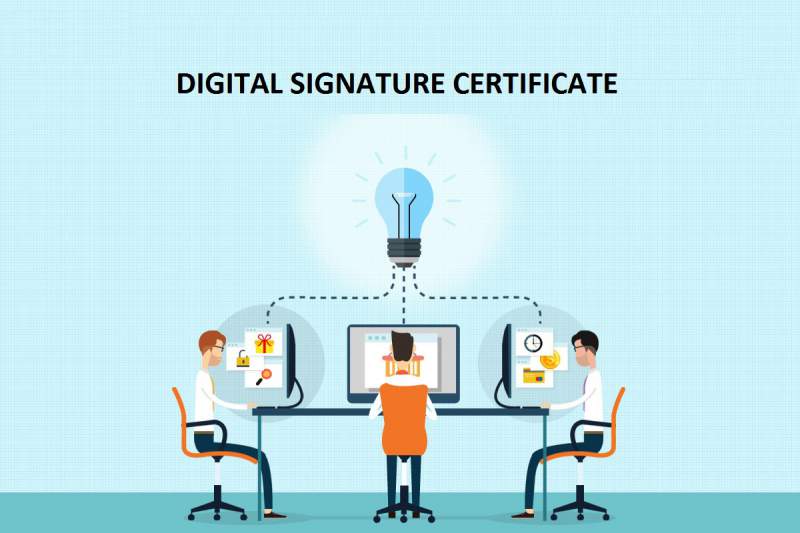Digital Signature Certificate – What it is and How to get it?
Posted on: 2017-12-12 04:19:58
The term digital signature certificate (DSC) can be defined as the electronic version of a paper certificate or a physical one such as a driving license or passport. They normally serve as proofs of identity of a person and are used in certain cases only. It is just like a passport that demarcates the country whose citizen you are. Thanks to your passport you can legally travel to a country.
In much the same way you can use a DSC in order to prove your identity as such in an electronic context. With the help of your DSC you would also be able to get access to technology as well as various other services on the internet. You can also sign various documents digitally as well.
Types of Digital Signature Certificate (DSC)
The different types of digital signature certificates are classified as 3 classes such as –
- Class 1 DSC: This signature certificate is issued and used for private/ individual’s purpose to identify and confirm the person’s name, contact details information subjected to verified against in database of certifying authority.
- Class 2 DSC: This signature certificate is issued and used for both business and individual personnel like director/partner/signatory authorities of the companies to represent and sign on various electronic documents.
- Class 3 DSC: This is the highest level authenticity DSC issued for organization/ individual’s to participate in e-commerce auction or online tender signing.
Where these DSCs are being used?
The organizations or companies or individuals are required DSC for the purpose of –
- Filing ROC in MCA portal
- GST filing
- Income tax filing
- Trademark & Patent
Why are DSCs important?
With the help of a DSC you would be able to authenticate your signature electronically. You also get a high amount of security by using this in the context of your online transactions. This digital signature makes sure that the information, which you exchanged during a particular transaction, remains absolutely private. The certificate can also be used to encrypt information in such a way that only the intended recipient is able to read it.
When you sign in any documents digitally or electronically, you're basically assuring the addressee that no information has been misrepresented in as an interim measure. The DSC also helps you verify your identity as far as being the sender of said message is concerned.
How to obtain DSCs in India?
As far as India is concerned, the legally valid DSCs are issued by certain entities. The highest among them is the Controller of Certifying Authorities (CCA). Next in line are the certifying authorities (CAs) who have been licensed by the Indian government. A prominent name among them is eMudhra. You can get secure digital signatures from them.
There are different options over here that are supposed to suit the requirements of different kinds of individuals as well as organizations. As far as the application process is concerned, you can easily visit the official website of eMudhra and find out as to how you need to apply for the DSCs, it is nicely said by ClearTax.
There are number of vendors who have Certifying Authority like Emudhra, Ncode Solution, Sify, etc
If you're looking for any kind of DSC for your personal or business use, we will help you to obtain your DSC in Bengaluru, Karnataka or anywhere in India. Because you know that most of the works are done online in these days.
Procedure for Obtaining Digital Signature
- Print Application Form as per your requirement
- Complete the documents as per listed below with self attested copies
- Send all the scan required documents
- After confirmation, please make payment the necessary fees
- Confirmation of SMS or Video
- Send document by courier or ask for pick up
- Download your Digital Signature Certificate through online using code
Documents Required for Obtaining Class 2 Individual
- ID Proof of Applicant (as Aadhaar/ Voter ID/ PAN Card/ Passport, Driving License)
- Address Proof of Applicant (Bank Account Statement, Utility Bill, Passport, etc.)
Documents Required for Obtaining Class 3 Digital Signature for Organization
For Limited/Private Limited/OPC/LLP/Partnership/proprietorship with seal and sign
- PAN Card of Applicant
- PAN Card of Organization
- Certificate of Incorporation
- Authorization Letter
- Application Form
- Current Account Bank statement
- MOA and AOA or LLP Agreement or Partnership deed or Proprietorship certificate
How are DSCs used?
The DSCs are used in a wide array of areas. You can use them in order to send and receive mails that have been signed digitally and are encrypted. They can be used in order to execute safe and sound transactions on the internet.
In fact, DSCs are also used in order to identify the other entities that may be taking part in a web-based transaction. You can use it for purposes such as eTendering and eProcurement. The DSCs are also used in order to file compliance with the Registrar of Companies in Ministry of Corporate Affairs (MCA).
If you wish to file your income tax returns on the internet then too you can use the DSCs. People also use DSCs in order to sign documents such as MS Word, PDFs, and MS Excel. If you wish to create a paperless office then this is easily the best bet that you got.
Are DSCs legal?
Ever since the Information Technology Act 2000 was enacted the DSCs have become legal in India. In fact, the CAs that issue these certificates work under the aegis of the Ministry of Information Technology of the government of India and it is the Information Technology Act that governs the entire procedure.
You should not though confuse a digital signature with a DSC. A digital signature is basically an electronic way of signing an electronic document. On the other hand, a DSC is basically a computer based record.
----------------------------------------------------------
Related Articles:
Know More About Director Identification Number (DIN) & How to Get It?
